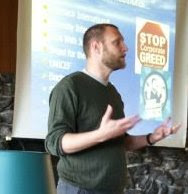Prisoners & Release
In 1913, 74 members of the International Workers of the World labor union (the "Wobblies") were arrested and put into the Snohomish County Jail near Everett, Washington. It was the newest jail, highest security technology - all steel. By common consent, all the Wobblies organized to start singing at a certain time that morning. They started singing, and jumping up and down, and soon enough hit the resonating frequency of the steel walls and broke the wall. They broke the jail by singing.
Now, it wasn't an earthquake, and they didn't have the opportunity to escape afterwards, but it does go to show the tremendous potential of being in prison for a just cause.
Paul and Silas were imprisoned and tortured because they set a girl free from economic exploitation. Her bosses were mad that they lost their source of revenue (they showed no concern for the girl, just their money), and took Paul and Silas to the authorities. The authorities, all too often ruled by the economic interests of the wealthy, agreed that Paul and Silas had to be kept under lock and key. Not only that, but stripped and beaten, then "severely flogged," and then taken to the inner-most cell of the jail, the most secure place, and even then put in stocks to hold them. (Sounds a little like Abu Ghraib.)
That night an earthquake destroys the jail (and their stocks?). The jailer comes rushing back, knowing that if these prisoners escaped it would be his life. He finds Paul and Silas waiting patiently for his return. The jailer asks: What must I do to be saved? His question is really a double entendre. What he means is what does he need to do to keep Paul and Silas from escaping, he is at their mercy. But what we know (because we're reading this story through the eyes of the Holy Spirit) is that what he needs is the gospel.
This is also a clear example of civil disobedience. Paul and Silas are arrested for an act of justice that violated the laws (and economic interests) of the rich and powerful. They do not take back the act, and do not attempt to evade the consequences of their actions. In fact, their submission to the laws (however unjust) is a double indictment of the injustice. Even when offered an opportunity to escape, they remain, forcing the authorities to confront the question of injustice in their midst.
But what is most striking is that the roles are reversed. (This is so Lucan.) Paul and Silas are tortured and imprisoned, but in the end they are the free ones, and it is the jailer who is tortured and imprisoned by his job and obligation and loyalty to the System, and it is he who requires liberation from his bondage. The jailer is converted by the experience of trying to hold Paul and Silas.
Individuals enmeshed in the System are converted not by people being nice and polite, but by people honestly and sincerely challenging the injustices supported by the actions of those enmeshed in the System. Paul and Silas' act showed the jailer who was really the victim of the State: not Paul and Silas the prisoners, but the jailer who is forced to torture and imprison men whose only crime is standing up against oppression.
The jailbreak, therefore, isn't for Paul and Silas, but for the jailer. When he asks: "What must I do to be saved?" he is recognizing that he is really not free, not safe, not saved.
What a tremendous testimony. Even those who are carrying out the orders of the System, who are doing terrible and unjust deeds, even those who think they are doing the right thing by supporting the State and its violence and oppression, can be converted by the civil disobedience and dedication of the faithful. A-men!



0 Comments:
Post a Comment
<< Home